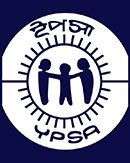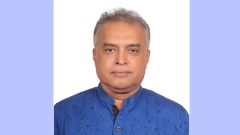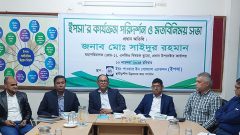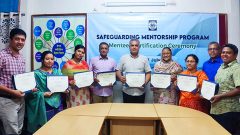The best practices of YPSA on Countering Xenophobia and Discrimination was discussed and presented at UN Headquarters in New York, USA. This event was held on 18 May 2018 at the Conference Room 7, UN Headquarter, New York. This event was organized by the subcommittee of Xenophobia and Social Inclusion of the NGO Committee on Migration.
Ashraf El Nour, Director, International Organization for Migration (IOM) office to UN was present as a key speaker of this event. Representatives of NGO Committee on Migration was present in this event. The session was facilitated by Saionara Konig Reis, Head of New York Office, UN, Dianova International. In this session the good practices on Countering Xenophobia and Promoting Social Inclusion of eight selected NGO’s around the world was discussed and presented.
It is a matter of proud that UN has discussed the practices of YPSA on Countering Xenophobia and Promoting Social Inclusion. As well as highlighted the eight NGO’s practices on around the world. The selection process of NGO’s was finalize by the skimming and scanning of good practices of NGO’s. Finally, the organizer NGO Committee on Migration has selected the good practices of YPSA with other eight NGO’s around the world including Migration Community Centre (MCC); Lebanon, iHoop; Sweden, Saint Andrew’s Refugee Services; Egypt, Council of Sab-Sahara Migrants; Morocco, Change makers Lab; Greece, AMURA Association; Argentina, Research Centre for Asylum and Migration; Turkey and Anti-Racism Movement (ARM); Lebanon.
In YPSA’s film, Md. Arifur Rahman, Chief Executive of YPSA said that Inclusion is a universal human rights whose aim is to embrace all people, irrespective of race, gender, disability or other attribute which can be perceived as different. YPSA has been practicing the diversity and inclusion in regardless of every interventions.
YPSA has seven core values and respect for diversity is one of the major core value of YPSA. YPSA has worked hard to embrace diversity within their workplaces and create an environment where everyone, regardless of gender, sexual orientation, cultural background or disability, can flourish and succeed. In regards of promoting safe orderly and regular migration, YPSA has been implementing Fairer Labour Migration Project.
By this project YPSA trying to improve the transparency and accountability of migration service provider’s institutions. As well as exploring the opportunities to backstop the system change through initiatives that build the capacity of migrants to make informed choice. Alike on preventing human trafficking YPSA has been implementing different awareness interventions, networking and referral with respective concern institutions. Also given shelter and protection and prevention services to survivors through shelter based and community based integrated services. YPSA also supporting to returnee migrants (survivors) in regards of social and economic reintegration in their community.YPSA believes that these efforts is supporting to achieve organization vision as well as supporting on achieving Sustainable Development Goals.
In that event, NGO Committee on Migration has called some actions for countering Xenophobia and Social Inclusion as;
- Collaborative with and maintain a sustainable, supportive network of activist groups to protect migrant/refugee against xenophobia, racism and to advocate for their well-being.
- Engage local communities in countering xenophobia and racism among migrants/refugee by developing and implementing social inclusions and integrating policies and practice.
- Promote ethnically and socially diverse migrants/refugee children, youth and adults interacting together in play, education and work age group as a strategy for overcoming negative stereotypes about others form their home countries and forming diverse friendships within migrant/refugee communities.
- Create and maintain safe community space for gatherings, whereas strong relationships among refugee/migrants and between them and local stakeholders and authorities can be built.
- Promote empowerment of migrants/refugee through strategies to develop their capacities, including strategies for working together to access resources, learning about and engaging in advocacy for their human rights, learning the cultural and legal systems of host communities.
- Enable migrants/refugee to participate in making decisions affecting their wellbeing and in assuming leadership for running and managing migrant/refugee centers.
- Promote intercultural contact and understanding through programmes, with local educational institutions, holding regular and frequent meetings, intercultural dialogues, artistic performance such as choir, and through conversational dinners consisting of migrants/refugee and local partners.
- Promote opportunities for the voice of migrants/refugee to be heard and disseminated, telling their stories in traditional oral face to face and digitized formats, for the purpose of changing the negative narratives and false representatives prevalent about them in most societies.
- Provide human rights and media training to disseminate stories by migrants/refugee and to improve the overall quality and validity of reporting about migrant/refugee in the media.
- Educate local and civil society groups on human rights, including the human rights of migrants/refugee and empower them to promote the inclusions and integrations of migrants/refugee.
link: http://webtv.un.org/watch/countering-xenophobia-and-discrimination-voices-from-the-regions-international-organization-for-migration-iom/5786872286001/



